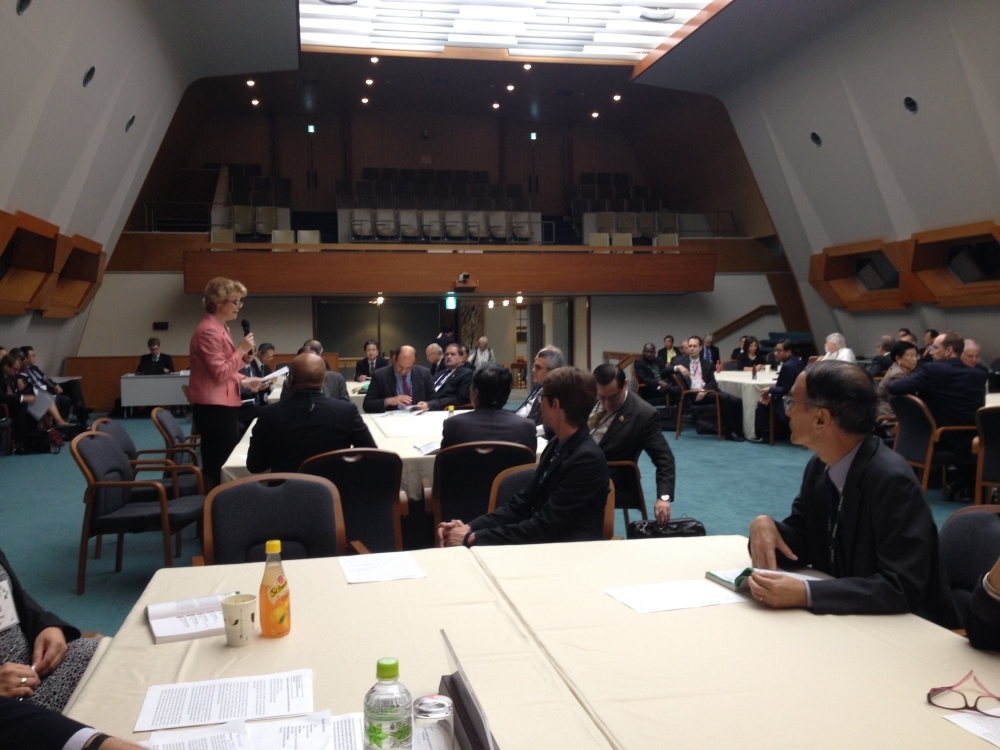

Brazilian researchers supported by FAPESP attended the 12th Annual Meeting of the Science and Technology in Society Forum on October 4-6 in Kyoto, Japan (photo: release)
12th Annual Meeting of the Science and Technology in Society Forum was attended by approximately 1,000 people from 100 countries.
12th Annual Meeting of the Science and Technology in Society Forum was attended by approximately 1,000 people from 100 countries.

Brazilian researchers supported by FAPESP attended the 12th Annual Meeting of the Science and Technology in Society Forum on October 4-6 in Kyoto, Japan (photo: release)
By Diego Freire
Agência FAPESP – Brazilian researchers supported by FAPESP participated in the 12th Annual Meeting of the Science and Technology in Society Forum (STS Forum), held on October 4-6 in Kyoto, Japan. STS Forum is a Japan-based, international, not-for-profit organization that brings together scientific leaders from many countries, as well as technology companies, research funding agencies and policymakers, to discuss long-term directions for science and technology.
This year’s meeting was attended by approximately 1,000 people from 100 countries. FAPESP is an associate member of STS Forum and was represented at the event by Daniel Youssef Bargieri from the University of São Paulo’s Biomedical Science Institute (ICB-USP). According to Bargieri, the focus of this meeting was a debate about the influence of scientific knowledge on decisions that directly affect society.
“There has to be more dialogue between the scientific community and those who decide the direction to be taken by society and humanity as a whole,” he said. “The starting-point must be more dialogue among scientists, and STS Forum makes this interaction possible on a global scale. The ideas now have to be brought to the local level so that we can address our needs right here.”
Bargieri is responsible for the research project “Cell biology and molecular genetics of hemoparasites”, funded by FAPESP under its Young Investigator Award Program.
Also attending the event was Jayme Augusto de Souza-Neto, a researcher affiliated with São Paulo State University’s Biotechnology Institute (IBTEC-UNESP) who is responsible for the projects “Characterization of microbiota-mediated anti-dengue mechanisms in wild Aedes aegypti populations” and “A lab system to study Plasmodium vivax transmission and interactions with the vector”.
“The fact that young Brazilian researchers attend a global event like the STS Forum is evidence of Brazil’s participation in this community, which influences science-based decisions for the future by discussing how scientific research will address the problems of society and mankind. Scientists, the tech community and governments are deeply concerned about how to tackle these problems now, rather than leaving them to the next generation,” said Souza-Neto, who represented FAPESP at the 2014 meeting.
Statement
Part of the STS Forum’s 2015 program covered topics relating to the research interests of Bargieri and Souza-Neto. According to the statement issued by the meeting, “A new international system is required to improve collaboration among developed and developing countries and the World Health Organization (WHO) for global health, especially for dealing with infectious disease pandemics”.
The conference program also covered energy and the environment, emphasizing the need to prioritize renewable fuels. According to the statement, “Over the long term, continued burning of fossil fuels will exact an unacceptable environmental cost […]. We should have diverse energy sources for ensuring reliable and stable supply, and nuclear power should remain an important option, under the conditions of safety, security and non-proliferation”.
The document also stresses the importance of establishing an international framework for effectively mitigating greenhouse gas emissions that includes all countries. “We hope that our message will be reflected in the discussions at the United Nations Climate Change Conference (COP21) in December 2015 in Paris,” the statement says.
Another highlight was industrial innovation that is being driven by new manufacturing technologies, robotics, nanotechnology and new materials, which according to the statement “is playing a vital role in various areas, including product development, healthcare and urban living.”
In this context, it states, “the ultimate source of major innovation is basic science, which has to be supported in both the public and private sectors”.
It also states that “We should strive to develop a coalition that includes the public and private sectors, academia, government and industry. Chief Technology Officers should become bridges between business and academia in the development of science and technology to nurture innovation.”
Participation by research funding agencies
For FAPESP Vice President Eduardo Moacyr Krieger, who attended previous annual meetings of the STS Forum, research funding agencies have an important role in achieving the goals outlined by the statement.
“The STS Forum agenda covers every topic of global interest relating to science and with direct repercussions for society,” Krieger said. “Research funding agencies have an immediate need to participate in these discussions because a great deal of the research funded in their countries depends on collaboration with other countries. The context is increasingly international. The world also has a special interest in Brazil in several of the areas covered by the program, and FAPESP’s frequent participation in these annual meetings reflects the particular importance of São Paulo State to the international scientific community.”
The next STS Forum annual meeting is scheduled for October 2-4, 2016, also in Kyoto, Japan.
For more information, visit www.stsforum.org.
Republish
The Agency FAPESP licenses news via Creative Commons (CC-BY-NC-ND) so that they can be republished free of charge and in a simple way by other digital or printed vehicles. Agência FAPESP must be credited as the source of the content being republished and the name of the reporter (if any) must be attributed. Using the HMTL button below allows compliance with these rules, detailed in Digital Republishing Policy FAPESP.





